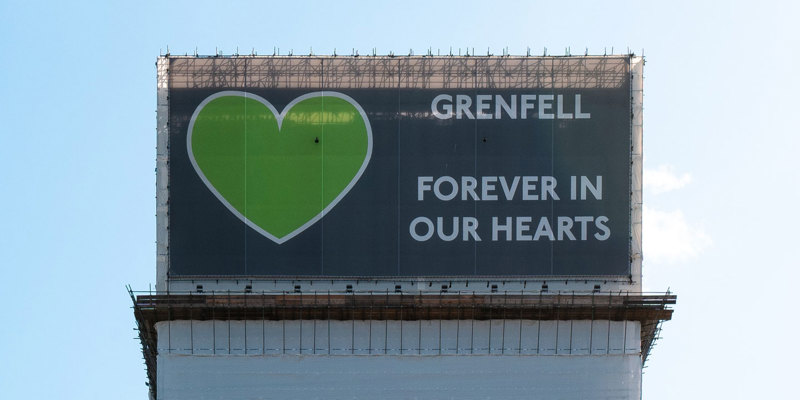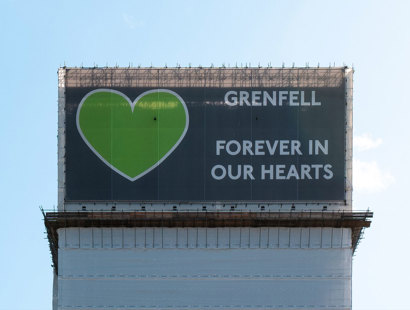
Russell-Cooke welcomes findings of Grenfell Inquiry Phase 2
Russell-Cooke, one of the legal advisors to the victims of the Grenfell Fire disaster, has welcomed the findings and recommendations set out in the final Phase 2 Report by the Grenfell Tower Inquiry, and joins calls for additional measures to urgently address delays in the removal of dangerous cladding.
The report, published today, comes more than four years after the Inquiry’s Phase 1 Report, and more than seven years on from the fire at Grenfell Tower in June 2017. It presents the Inquiry’s findings following approximately 400 days of public hearings between 2020 and 2022, in which evidence was heard from expert witnesses, local authority leaders, corporate executives from the construction and property industries, as well as the bereaved, survivors, and residents (BSR) of the Grenfell Tower.
The findings cover a number of critical issues including causation, responsibility, decision making, and the dangers associated with various combinations of cladding and insulation.
Key findings of Grenfell Inquiry Phase 2 Report
Key findings of the report include:
- the deaths of 72 people in the fire were wholly avoidable and many opportunities to avoid the disaster were missed
- “decades of failure” by successive Governments failed to act on those opportunities and the Government department responsible for fire safety displayed a “complacent and at times defensive attitude to matters affecting fire safety”
- deregulation dominated the Government’s agenda to such an extent that “even matters affecting the safety of life were ignored, delayed or disregarded”
- there was systemic and calculated dishonesty by cladding and insulation manufacturers that engaged in “deliberate and sustained strategies to manipulate the testing process” to deliberately conceal the danger of using their flammable products, and complicity by those tasked with regulating them that were “unwilling to upset [their] own customers”
- the Tenant Management Organisation (TMO) considered the residents of Grenfell Tower that repeatedly raised fire safety concerns “militant troublemakers” and failed to take their responsibilities to keep residents safe from fire sufficiently seriously. Both the TMO and RBKC (Royal Borough of Kensington and Chelsea) maintained a “persistent indifference to fire safety, particularly the safety of vulnerable people"
- the TMO’s only fire risk assessor was “ill qualified to carry out fire risk assessments on buildings of the size and complexity of Grenfell Tower”
- those responsible for the refurbishment project were ignorant of their duties to ensure the building was safe. The architects demonstrated a “cavalier attitude to the regulations affecting fire safety”. Accountability was diluted as “everyone involved in the choice of materials to be used in the external wall thought that responsibility for their suitability and safety lay with someone else”
- RBKC was insufficiently prepared to respond to the aftermath of the fire and their inadequacy compounded the suffering of the bereaved, survivors and residents. The response to the fire “demonstrated a marked lack of respect for human decency and dignity and left many of those immediately affected feeling abandoned by authority and utterly helpless”
- residents of social housing deserve understanding and respect. Personal Emergency Evacuation Plans (PEEPS) and their inclusion in fire safety strategy is essential to prevent the future loss of life of vulnerable and disabled people
- the Building Safety Act, though welcome, is not sufficient to bring about the lasting cultural change required in the construction industry
- the definition of a “higher risk building” in the Building Safety Act should be urgently reviewed and a higher risk building no longer defined with reference only to height, but also to the nature of its use and the likely presence of vulnerable people.
According to the latest figures from the Ministry of Housing, Communities, and Local Government, of the 4,630 residential buildings standing at 11 metres or higher that are known to have unsafe cladding, 2,331 or approx. 50% had not started remediation as of the end of July 2024. Only 29% have completed remediation works.
Comments from the Russell-Cooke property litigation team
Caroline Brosnan, Senior Associate at Russell-Cooke, comments:
“This report is the culmination of more than seven years of work on behalf of our clients who number among the many bereaved, survivors, and residents of the Grenfell Tower disaster. Together they have fearlessly campaigned for transparency and accountability over the injustices that led to the deaths of 72 people.
“With the publication of the Phase 2 report, the causes of the tragic events of the 14 June 2017 are clear to see – as is the need for urgent reforms to guarantee greater accountability across the development and management of housing in the UK.
“Whilst the report is clear about apportioning responsibility for the disaster, some of the recommendations to remedy the situation are not as strong as we would have hoped. For example, whilst the TMO and RBKC are heavily criticised for the way that they treated their tenants and the power imbalance in the relationship is highlighted, the Report makes no recommendations because they note that the Social Housing (Regulation) Act 2023 has come into force. Although it has started to make a difference, it is a relatively new regime, and one that has already shown that many social housing tenants remain in unsafe housing over seven years after the Grenfell Tower fire and that fire safety is still not consistently maintained in social housing stock. That the Inquiry should therefore conclude that the Social Housing (Regulation) Act is sufficient is therefore surprising, and means that if monitoring of recommendations is implemented, then the culture of disregard for tenants in social housing will be ignored in that monitoring process. An inquiry which was about the experience of being a social housing tenant is effectively silent on safeguarding the experience of social tenants going forward so that the tenants voice is lost from the process.”
The reality is that thousands of people across the UK still feel unsafe in homes wrapped in combustible cladding and insulation materials, more than seven years on from the events at Grenfell. Our clients urge the Government to act swiftly to implement the recommendations of the report and bring forward additional measures to facilitate the immediate removal of unsafe cladding from all buildings in the UK."
Consultant at Russell-Cooke, says:
"The Inquiry has found there was systematic dishonesty by the manufacturers of the cladding and the insulation, causing highly flammable and dangerous materials to have been fitted in the refurbishment of Grenfell Tower. Those materials should never have been used. Those tasked with checking and regulating the safety of the materials either failed in their responsibilities or were compromised by their own commercial interests.
The victims of the disaster whom we represent wish to see justice in the form of criminal prosecutions of those who were really culpable, including those who deliberately cheated the regulatory system, knowing they were risking lives, motivated by profit . We will be actively pursuing the issue of prosecutions and liaising with the police and CPS on our clients’ behalf.”
Russell-Cooke's property litigation expert comments:
"What was long suspected and was abundantly clear after the 400+ days of Inquiry evidence was that the fire and the 72 deaths were avoidable. Many individuals and institutions bear responsibility for those deaths from central and local Government who wrote the rules distinguishing what was safe and what was not, the regulatory and certification bodies who approved the fatal cladding, the contractors who designed and installed the cladding and those who made it."
The Phase 2 report highlights the wide-ranging and systemic incompetence at all levels when it comes to a true understanding of fire safety and the deliberate deception by some motivated by commercial interest to avoid what safeguards there were.
He adds that "this Government should move swiftly to implement the Inquiry’s recommendations including:
- the urgent reform to Personal Emergency Evacuation Plans (PEEPS)
- the creation of a properly funded, truly independent Government body to properly regulate the construction and fire-safety sectors
- a re-assessment of which buildings are considered “High Risk”
- the establishment of a mechanism for ensuring that the recommendations of all public inquiries is monitored by Government and the reasons for not implementing them justified.
Anything less than the most serious engagement with the Inquiry’s recommendations would amount to a further betrayal of our clients and the public.”
Jodie Green, associate at Russell-Cooke, says:
"It is clear from the Inquiry’s final report that the voices of the residents of Grenfell Tower and the local community have long been ignored and marginalised. The TMO ignored the residents’ fire safety concerns, labelling them as "militant activists". Both the TMO and the RBKC had a persistent indifference to fire safety, particularly the safety of vulnerable residents of the tower. RBKC’s woefully inadequate response to the fire showed a lack of respect for human decency, with former residents of Grenfell Tower remaining in unsuitable temporary accommodation now, some seven years after the fire."
The former residents of Grenfell Tower and the local community have learnt that the people they can trust and rely upon are each other."
The Russell-Cooke team advising in relation to the Inquiry comprised:
- Caroline Brosnan
- Jodie Green
- Tom Hopkins
- Dominic Fairclough
As well as representing a BSR group in the Grenfell Tower Inquiry, Russell-Cooke’s Property Litigation team recently acted for tenants in the first Remediation Order under the Building Safety Act 2022 for cladding and building safety defects.
Our press release was issued to the media on 4 September which has resulted in Russell-Cooke's property litigation expert appearing in The Times and two articles by Inside Housing (first and second.) Russell-Cooke's property litigation expert has also been quoted in The Law Society Gazette, and Caroline in The Guardian.
Caroline Brosnan, and Jodie Green are in the property litigation team.
Get in touch
If you would like to speak with a member of the team you can contact our property litigation solicitors by email, by telephone on +44 (0)20 3826 7525 or complete our enquiry form.




